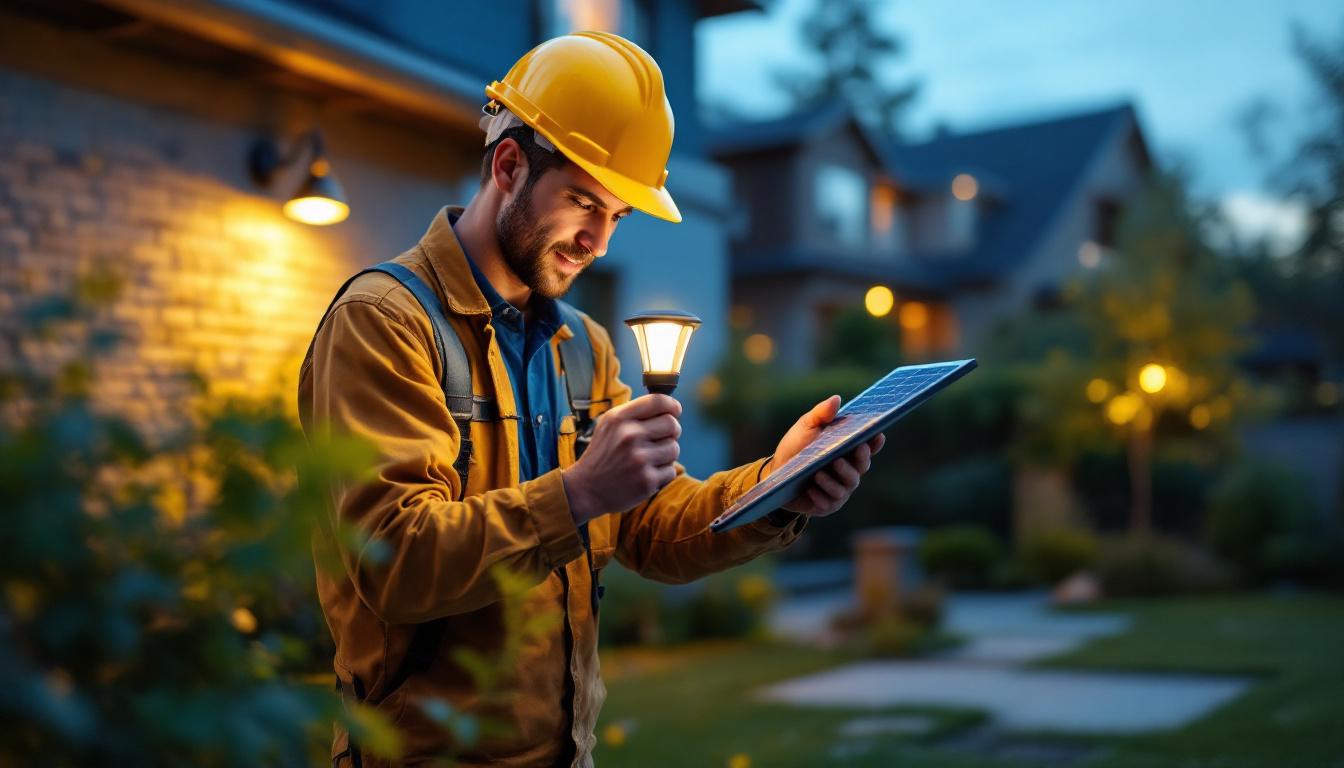
Small solar LED systems combine photovoltaic solar panels with energy-efficient LED lighting to create self-sustaining illumination solutions. Unlike traditional wired lighting, these systems harness sunlight during the day, store energy in batteries, and power LEDs after dark. This independence from the electrical grid makes them particularly valuable in remote or off-grid locations, as well as for sustainable urban lighting projects. Such systems not only reduce reliance on fossil fuels but also contribute to lowering greenhouse gas emissions, making them an eco-friendly choice for modern lighting needs.
For lighting contractors, grasping the core components and how they interact is crucial. A typical small solar LED setup includes a compact solar panel, a rechargeable battery, a charge controller, and the LED fixture itself. Each part plays a specific role: the solar panel captures sunlight, the battery stores energy, the controller manages charging and discharging to protect battery life, and the LED delivers efficient illumination. Understanding the specifications of each component is essential for optimizing performance; for example, selecting the right battery type can significantly affect the system’s efficiency and longevity, ensuring that the lights remain operational even during prolonged cloudy periods.
LEDs are the preferred light source due to their low power consumption, long lifespan, and durability. When paired with solar power, they enable lighting solutions that require minimal maintenance and offer significant energy savings over time. The versatility of small solar LED systems allows them to be used in various applications, from pathway lighting in parks to security lighting in residential areas. Moreover, advancements in solar technology have led to the development of more efficient solar panels and batteries, which further enhance the performance of these systems. As the demand for sustainable energy solutions grows, the integration of smart technology into solar LED systems is also on the rise, allowing for features such as motion sensors and remote monitoring, which can optimize energy usage and improve overall functionality.
Small solar LED systems eliminate the need for trenching, wiring, and connection to the electrical grid. This can drastically reduce installation time and costs, especially in areas where running power lines is expensive or impractical. For contractors, this means more projects can be completed quickly and with fewer logistical challenges.
Additionally, the modular nature of small solar LED units allows for scalable and customizable lighting designs. Whether it’s pathway lighting, signage illumination, or security lighting, these systems can be easily adapted to different site requirements without major infrastructure changes. This flexibility not only enhances the contractor’s portfolio but also opens up opportunities in diverse environments, from urban settings to remote locations where traditional lighting solutions may not be feasible.
Moreover, the quick installation process can lead to increased customer satisfaction, as clients appreciate the minimal disruption to their daily activities during setup. Contractors can also take advantage of this efficiency to offer competitive pricing and faster turnaround times, positioning themselves favorably in a crowded market.
Energy efficiency is a major selling point. LEDs use a fraction of the power compared to traditional incandescent or fluorescent bulbs, and solar power is completely renewable. Lighting contractors can leverage this to meet growing client demands for green building solutions and comply with increasingly stringent energy codes and sustainability standards.
Clients benefit from lower operational costs since solar LED lights require no electricity bills and minimal maintenance. This long-term cost-effectiveness can be a compelling argument when pitching projects. Furthermore, as more businesses and homeowners become environmentally conscious, the appeal of solar LED systems aligns perfectly with their values, making it easier for contractors to market these solutions as not just practical, but also responsible choices for the planet.
In addition, the integration of smart technology with solar LED systems is on the rise. Features such as motion sensors and remote control capabilities can further enhance energy savings and provide users with greater control over their lighting, making these systems even more attractive to tech-savvy clients looking for innovative solutions.
Small solar LED systems are designed for durability. LEDs have long lifespans, often exceeding 50,000 hours, and solar panels typically come with warranties guaranteeing performance for 20 years or more. Batteries, while requiring replacement every few years, are generally easy to access and swap out.
Lighting contractors should emphasize the low maintenance aspect to clients. No wiring means fewer points of failure, and the self-contained nature of these systems reduces the risk of outages caused by power grid issues. This reliability is especially important for safety and security lighting applications.
Furthermore, advancements in solar technology have led to improved energy storage solutions, allowing for better performance even during cloudy days or in less sunny regions. This means that clients can trust their solar LED systems to function effectively year-round, providing peace of mind and consistent illumination. Contractors can highlight these advancements as a testament to the evolving nature of solar technology, reassuring clients that they are investing in a cutting-edge solution that will stand the test of time.
Before specifying or installing small solar LED systems, contractors must conduct thorough site assessments. The performance of solar panels depends heavily on exposure to direct sunlight. Shading from trees, buildings, or other obstructions can significantly reduce energy harvesting and, consequently, light output.
Understanding the solar path and seasonal variations is essential. A site that receives ample sunlight during the day will ensure the battery is fully charged to power the LEDs overnight. Conversely, locations with limited sun exposure may require larger panels or supplemental power sources to maintain consistent illumination.
Battery sizing is critical. The battery must store enough energy to power the LED during the entire period of darkness, including cloudy days or extended periods without sunlight. Contractors should calculate the expected runtime based on the LED wattage, desired hours of operation, and local weather patterns.
Choosing the right battery chemistry is also important. Lithium-ion batteries offer higher energy density and longer lifespans but come at a higher upfront cost. Lead-acid batteries are more affordable but heavier and require more frequent replacement. Contractors need to balance cost, performance, and maintenance considerations when selecting batteries.
Not all LEDs are created equal. Contractors must specify fixtures that provide adequate brightness (measured in lumens) and appropriate color temperature for the application. For example, pathway lighting benefits from warm white LEDs that create a welcoming atmosphere, while security lighting may require cooler, brighter light for better visibility.
Fixture design also impacts durability and performance. Weatherproof, vandal-resistant housings are essential for outdoor installations. Additionally, some small solar LED units come with integrated sensors such as motion detectors or ambient light sensors, enhancing energy efficiency and functionality.
Solar energy availability fluctuates with weather conditions. Extended cloudy or rainy periods can reduce battery charging, leading to dimmer lights or outages. Contractors should account for these scenarios by oversizing solar panels or batteries or incorporating hybrid systems that can draw supplemental power if needed.
Providing clients with realistic expectations about performance during adverse weather is important. Offering maintenance plans to monitor and adjust system settings or replace batteries can help maintain optimal operation.
Small solar LED units are often installed in public or semi-public spaces, making them vulnerable to theft or vandalism. Lighting contractors should recommend secure mounting solutions, tamper-resistant hardware, and possibly surveillance integration to protect investments.
Using fixtures with integrated batteries and controllers can reduce the number of visible components, minimizing opportunities for tampering. Educating clients on the importance of site security can save time and costs associated with repairs or replacements.
Lighting contractors must stay informed about local regulations governing outdoor lighting, energy efficiency, and solar installations. Some jurisdictions have specific requirements for light pollution, brightness levels, or solar system certifications.
Failure to comply can result in costly rework or legal issues. Working closely with local authorities and specifying products that meet recognized standards helps avoid these pitfalls. Documenting compliance also builds client confidence and supports project approvals.
While small solar LED systems excel in standalone applications, they can also complement traditional grid-powered lighting. Hybrid systems that combine solar with grid backup provide reliability and flexibility, especially in critical areas like emergency lighting or high-traffic zones.
Lighting contractors can design systems where solar LEDs operate primarily on stored energy but switch to grid power during extended low-sun periods. This approach maximizes energy savings while ensuring consistent illumination.
Advancements in smart lighting technology allow small solar LED systems to be integrated with remote monitoring and control platforms. Features such as dimming, scheduling, and fault detection can be managed via mobile apps or centralized control systems.
For lighting contractors, offering smart solar LED solutions can differentiate their services and provide clients with enhanced control and data insights. This can lead to improved maintenance efficiency and better energy management.
Small solar LED lighting is versatile. It’s suitable for residential pathways, commercial signage, parking lots, parks, and even agricultural settings. Lighting contractors should tailor solutions to the specific needs of each sector, considering factors like lighting levels, aesthetics, and durability.
Understanding the unique demands of different environments helps contractors recommend the most effective products and installation methods, ensuring client satisfaction and long-term system performance.
Small solar LED technology offers lighting contractors a powerful tool to deliver efficient, cost-effective, and sustainable lighting solutions. Mastery of system components, design considerations, and potential challenges is essential to successful project execution.
By staying current with technological advances, local regulations, and client needs, contractors can expand their service offerings and tap into growing markets for renewable energy lighting. Small solar LEDs represent not just a product choice but a strategic opportunity to lead in the evolving lighting industry.
Ready to harness the power of small solar LED technology for your next lighting project? At LumenWholesale, we provide lighting contractors with the highest quality, spec-grade lighting products at exceptional wholesale prices. Say goodbye to local distributor markups and hello to a vast selection of reliable, high-performance lighting that meets rigorous industry standards. With free shipping on bulk orders, LumenWholesale is your go-to source for premium lighting solutions that combine quality, affordability, and convenience. Elevate your lighting game and ensure your projects shine bright. Discover Wholesale Lighting at the Best Value today!

Discover innovative strategies and expert tips for lighting contractors to optimize high bay metal halide lights.

Discover how an automatic timer switch for lights can revolutionize your lighting projects by enhancing efficiency and reducing energy costs.

Explore the world of light bulb base sizes and discover the best alternatives for lighting contractors.

Discover the art and science of museum lighting with “Museum Light: The Ultimate Handbook for Lighting Contractors.” This comprehensive guide offers expert insights, innovative techniques, and practical tips to illuminate exhibits while preserving artifacts.